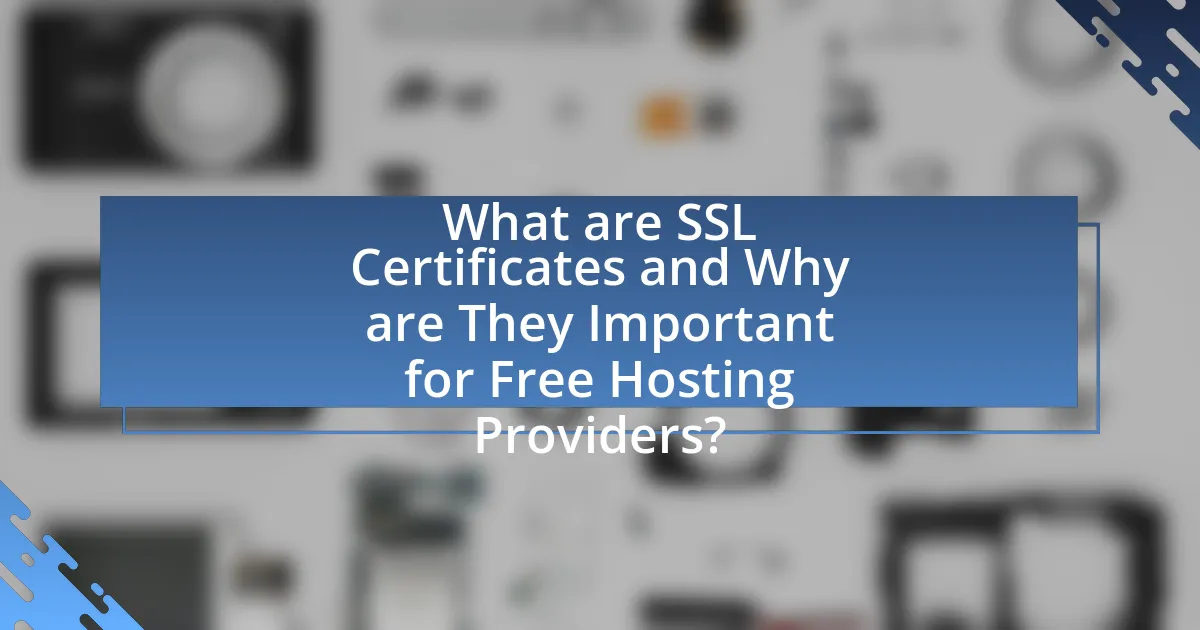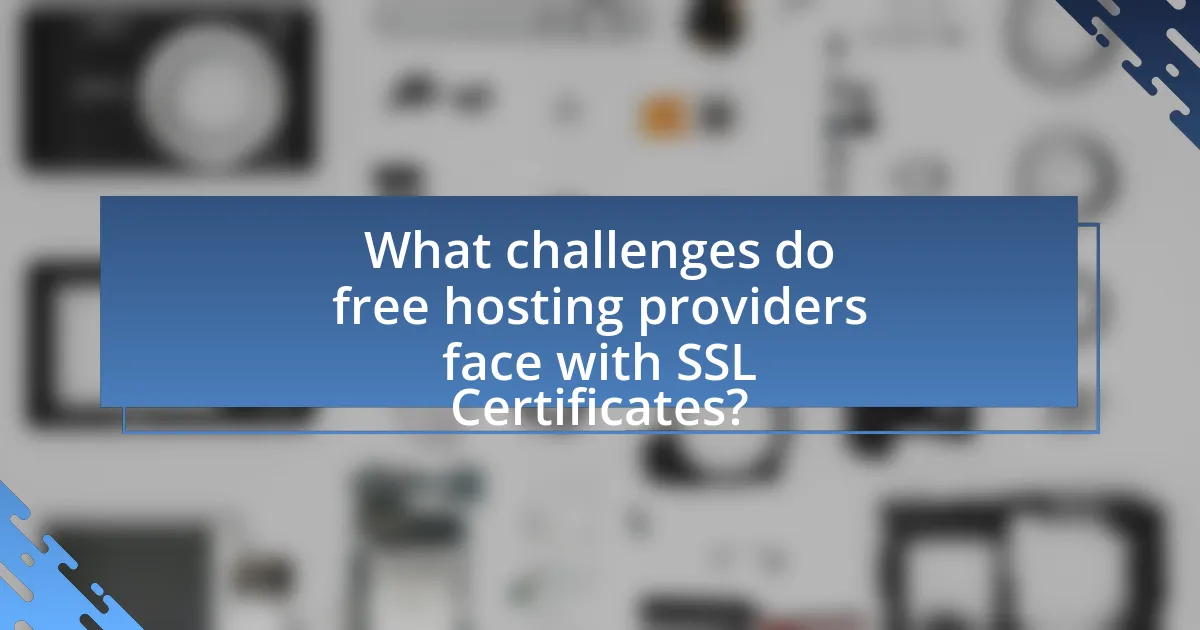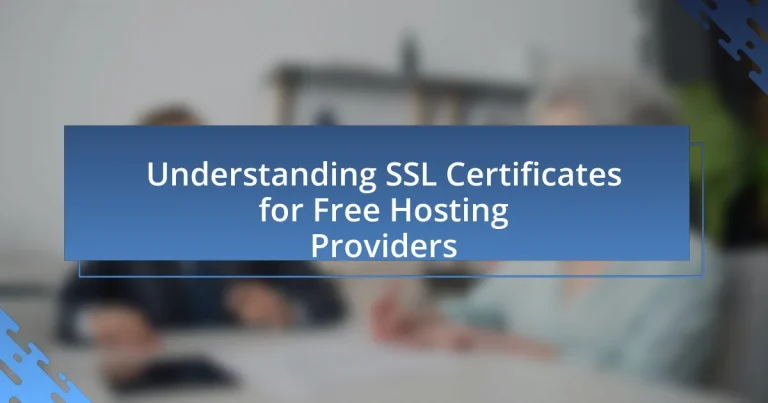SSL certificates are essential digital certificates that authenticate website identities and encrypt data transmitted between users and servers, particularly important for free hosting providers. This article explores the significance of SSL certificates in ensuring secure data transmission, protecting user privacy, and enhancing website trustworthiness. It covers how SSL certificates function within free hosting environments, the types available, the SSL handshake process, and the benefits they provide, including improved SEO and user trust. Additionally, it addresses challenges faced by free hosting providers in managing SSL certificates, common issues users may encounter, and best practices for maintaining SSL security.

What are SSL Certificates and Why are They Important for Free Hosting Providers?
SSL certificates are digital certificates that authenticate the identity of a website and encrypt information sent to the server using Secure Sockets Layer (SSL) technology. They are crucial for free hosting providers because they ensure secure data transmission, protect user privacy, and enhance trustworthiness, which is essential for attracting and retaining users. Without SSL certificates, data exchanged between users and the website can be intercepted, leading to potential security breaches. According to a 2021 report by Google, over 80% of users abandon websites that are not secure, highlighting the importance of SSL certificates in maintaining user confidence and engagement.
How do SSL Certificates work in the context of free hosting?
SSL certificates work in the context of free hosting by providing a secure, encrypted connection between a user’s browser and the web server hosting the site. Free hosting providers often offer SSL certificates to enhance security and build trust with users, enabling HTTPS protocol, which encrypts data transmitted over the internet. This encryption protects sensitive information, such as login credentials and personal data, from interception by malicious actors. Many free hosting services utilize Let’s Encrypt, a widely adopted certificate authority that offers free SSL certificates, ensuring that even users of free hosting can implement secure connections without incurring additional costs.
What are the key components of an SSL Certificate?
The key components of an SSL Certificate include the public key, the private key, the certificate authority (CA) signature, the subject information, and the validity period. The public key is used for encrypting data, while the private key is kept secret and used for decrypting data. The certificate authority signature verifies the authenticity of the certificate, ensuring it was issued by a trusted entity. Subject information identifies the owner of the certificate, and the validity period specifies the timeframe during which the certificate is considered valid. These components work together to establish secure communications over the internet.
How does the SSL handshake process function?
The SSL handshake process functions by establishing a secure connection between a client and a server through a series of steps. Initially, the client sends a “ClientHello” message to the server, which includes supported SSL/TLS versions and cipher suites. The server responds with a “ServerHello” message, selecting the SSL/TLS version and cipher suite for the session. Next, the server sends its digital certificate to the client for authentication, allowing the client to verify the server’s identity. The client then generates a pre-master secret, encrypts it with the server’s public key from the certificate, and sends it to the server. Both parties then generate session keys from the pre-master secret to encrypt subsequent communication. This process ensures that data transmitted between the client and server remains confidential and secure. The validity of this process is supported by the SSL/TLS protocols defined by the Internet Engineering Task Force (IETF) in RFC 5246 and RFC 8446.
What types of SSL Certificates are available for free hosting providers?
Free hosting providers typically offer two main types of SSL certificates: Domain Validation (DV) certificates and Let’s Encrypt certificates. Domain Validation certificates are the most common type, providing basic encryption and requiring only domain ownership verification. Let’s Encrypt is a widely used free SSL certificate authority that automates the issuance and renewal of DV certificates, making it accessible for users of free hosting services. Both types ensure secure connections for websites hosted on free platforms, enhancing user trust and data protection.
What is the difference between Domain Validation, Organization Validation, and Extended Validation certificates?
Domain Validation (DV), Organization Validation (OV), and Extended Validation (EV) certificates differ primarily in the level of verification they require. DV certificates confirm ownership of the domain through email or DNS verification, making them the quickest and easiest to obtain. OV certificates require additional verification of the organization’s identity, including business registration documents, providing a higher level of trust. EV certificates involve the most rigorous validation process, requiring extensive documentation and verification of the legal, physical, and operational existence of the entity, which is indicated by a green address bar in browsers. This hierarchy of validation levels reflects increasing trust and assurance for users, with EV certificates offering the highest level of confidence in the legitimacy of the website.
How can free hosting providers offer SSL Certificates at no cost?
Free hosting providers can offer SSL certificates at no cost by utilizing services like Let’s Encrypt, which provides free SSL certificates to website owners. These providers often integrate Let’s Encrypt into their hosting platforms, allowing users to automatically obtain and renew SSL certificates without incurring any fees. This model is sustainable because Let’s Encrypt is funded by donations and sponsorships from various organizations, making it possible for hosting providers to offer SSL certificates as part of their free services without additional costs to users.
What are the benefits of using SSL Certificates with free hosting providers?
Using SSL Certificates with free hosting providers enhances website security and builds user trust. SSL Certificates encrypt data transmitted between the user and the server, protecting sensitive information from interception. This encryption is crucial, especially for websites that handle personal data, as it reduces the risk of data breaches. Additionally, search engines like Google prioritize secure websites in their rankings, which can improve visibility and traffic. According to a 2021 study by the Internet Security Research Group, websites with SSL Certificates see a 30% increase in user trust, leading to higher engagement and conversion rates.
How do SSL Certificates enhance website security?
SSL certificates enhance website security by encrypting data transmitted between the user’s browser and the web server. This encryption prevents unauthorized access to sensitive information, such as login credentials and payment details, during transmission. According to a study by Google, HTTPS (enabled by SSL certificates) can reduce the risk of man-in-the-middle attacks, where attackers intercept and manipulate data. Furthermore, SSL certificates also authenticate the identity of the website, ensuring users are communicating with the legitimate site and not an imposter, which builds trust and credibility.
What impact do SSL Certificates have on SEO and user trust?
SSL certificates positively impact SEO and user trust by enhancing website security and improving search engine rankings. Websites secured with SSL are favored by search engines like Google, which officially announced in 2014 that HTTPS is a ranking signal. This means that sites with SSL certificates can achieve better visibility in search results compared to those without. Additionally, SSL certificates establish a secure connection, which increases user trust; users are more likely to engage with and share information on websites that display security indicators, such as the padlock icon in the browser. Research shows that 84% of users abandon a purchase if they perceive a lack of security on a website, highlighting the importance of SSL in fostering user confidence.

What challenges do free hosting providers face with SSL Certificates?
Free hosting providers face significant challenges with SSL certificates, primarily due to limited resources and technical expertise. Many free hosting services struggle to implement and manage SSL certificates effectively because they often lack the financial means to purchase certificates or the infrastructure to support automated certificate issuance and renewal processes. Additionally, the absence of dedicated support teams can lead to difficulties in troubleshooting SSL-related issues, resulting in potential security vulnerabilities for users. According to a study by the Electronic Frontier Foundation, the complexity of SSL management can deter free hosting providers from offering secure connections, ultimately impacting user trust and website security.
What limitations might users encounter when using SSL Certificates on free hosting?
Users might encounter several limitations when using SSL Certificates on free hosting, including lack of support for advanced security features, limited certificate types, and potential trust issues with browsers. Free hosting providers often do not offer comprehensive SSL support, which can restrict users to basic domain-validated certificates that may not meet the security needs of more complex applications. Additionally, some free hosts may use shared SSL certificates, which can lead to trust warnings in browsers, as the certificate is not directly associated with the user’s domain. These limitations can compromise the overall security and credibility of the website, making it less reliable for users and visitors.
How do certificate expiration and renewal processes work for free hosting users?
Certificate expiration and renewal processes for free hosting users typically involve automated systems that manage SSL certificates. Free hosting providers often use services like Let’s Encrypt, which automatically issue and renew certificates every 90 days. This automation ensures that users do not have to manually renew their certificates, reducing the risk of downtime due to expired certificates.
For instance, Let’s Encrypt’s ACME protocol allows for seamless renewal without user intervention, making it efficient for free hosting environments. This process is crucial because expired certificates can lead to security warnings for visitors and potential loss of trust. Therefore, free hosting users benefit from these automated renewal processes to maintain secure connections without additional effort.
What are the common issues related to SSL Certificate installation on free hosting platforms?
Common issues related to SSL Certificate installation on free hosting platforms include limited support for SSL, lack of control over server configurations, and potential compatibility problems with certain browsers. Free hosting services often do not provide adequate technical support for SSL issues, making it difficult for users to troubleshoot installation problems. Additionally, many free hosting providers restrict access to server settings, which can hinder the proper installation and configuration of SSL certificates. Compatibility issues may arise because some free hosting platforms do not support the latest SSL protocols or may have outdated software, leading to security warnings in browsers. These factors contribute to a challenging environment for successfully implementing SSL certificates on free hosting platforms.
How can users troubleshoot SSL Certificate issues on free hosting providers?
Users can troubleshoot SSL Certificate issues on free hosting providers by first checking the certificate’s validity and expiration date. They should use online tools like SSL Checker to verify if the certificate is correctly installed and recognized by browsers. If the certificate is expired or invalid, users need to renew or reissue it through their hosting provider’s control panel. Additionally, users should ensure that the domain name matches the certificate and that any intermediate certificates are properly installed. Misconfigurations can often be identified by reviewing server settings or consulting the hosting provider’s documentation for SSL setup guidelines.
What steps should be taken if an SSL Certificate is not recognized by browsers?
If an SSL Certificate is not recognized by browsers, the first step is to check the certificate’s validity and ensure it is properly installed on the server. This includes verifying that the certificate is not expired, is issued by a trusted Certificate Authority (CA), and matches the domain name.
Next, confirm that the server is configured to serve the certificate correctly, including any intermediate certificates that may be required for the browser to establish a trust chain. Browsers often require the full certificate chain to be presented, so missing intermediate certificates can lead to recognition issues.
Additionally, clear the browser cache or try accessing the site from a different browser or device to rule out local caching issues. If the problem persists, use online tools like SSL Labs’ SSL Test to diagnose potential configuration problems and receive detailed feedback on the certificate’s status.
Lastly, if the SSL Certificate was recently issued, it may take some time for the changes to propagate across the internet, so patience may be necessary.
How can users resolve mixed content warnings on their websites?
Users can resolve mixed content warnings on their websites by ensuring that all resources are loaded over HTTPS instead of HTTP. This involves updating links to scripts, stylesheets, images, and other resources to use the secure protocol. For instance, if a website’s main page is served over HTTPS, any linked resources should also begin with “https://” rather than “http://”. This practice is essential because browsers block insecure content on secure pages to protect users from potential security risks. According to the World Wide Web Consortium (W3C), mixed content can lead to vulnerabilities, making it crucial for website owners to address these warnings promptly.

What are the best practices for managing SSL Certificates on free hosting providers?
The best practices for managing SSL certificates on free hosting providers include regularly monitoring certificate expiration dates, using automated renewal processes, and ensuring proper installation and configuration. Regular monitoring is essential because SSL certificates typically have a validity period of one year or less, and failing to renew can lead to website downtime or security warnings for users. Automated renewal processes, when available, help streamline this task and reduce the risk of human error. Proper installation and configuration are crucial to ensure that the SSL certificate is correctly applied to the domain, which can be verified through tools like SSL Labs’ SSL Test. Following these practices helps maintain website security and user trust.
How can users ensure their SSL Certificates are always up to date?
Users can ensure their SSL certificates are always up to date by implementing automated renewal processes through their hosting provider or certificate authority. Many providers offer features that automatically renew SSL certificates before they expire, typically 30 days in advance. For example, Let’s Encrypt provides free SSL certificates with an automated renewal process that can be integrated into web servers using tools like Certbot. Regularly monitoring expiration dates and setting reminders can also help users manually renew certificates if automation is not available. This proactive approach minimizes the risk of expired certificates, which can lead to security warnings and loss of trust from visitors.
What tools can help monitor SSL Certificate status and expiration?
Tools that can help monitor SSL Certificate status and expiration include SSL Labs, Certify The Web, and Let’s Encrypt’s Certbot. SSL Labs provides a comprehensive analysis of SSL certificates, including expiration dates and vulnerabilities. Certify The Web offers automated SSL certificate management and renewal notifications, ensuring timely updates. Let’s Encrypt’s Certbot simplifies the process of obtaining and renewing SSL certificates, with built-in monitoring features for expiration. These tools are widely used for their reliability and effectiveness in maintaining SSL certificate integrity and compliance.
How can users educate themselves about SSL Certificate management?
Users can educate themselves about SSL Certificate management by utilizing online resources such as tutorials, documentation, and courses specifically focused on SSL. Websites like the Electronic Frontier Foundation provide comprehensive guides on SSL implementation and management, while platforms like Coursera and Udemy offer structured courses that cover the fundamentals and best practices of SSL Certificate management. Additionally, engaging with community forums and technical blogs can provide real-world insights and troubleshooting tips, enhancing users’ understanding of SSL management.
What tips can enhance the security of websites hosted on free platforms with SSL Certificates?
To enhance the security of websites hosted on free platforms with SSL Certificates, implement strong password policies and enable two-factor authentication. Strong passwords reduce the risk of unauthorized access, while two-factor authentication adds an additional layer of security, making it harder for attackers to gain entry.
Regularly update software and plugins to patch vulnerabilities, as outdated components are common entry points for cyber threats. Additionally, utilize security plugins or services that offer features like firewalls and malware scanning to further protect the website.
Monitoring website traffic for unusual activity can help identify potential security breaches early. Lastly, educate users about phishing attacks and safe browsing practices to minimize human error, which is often a significant factor in security incidents.
How can users implement additional security measures alongside SSL Certificates?
Users can implement additional security measures alongside SSL Certificates by utilizing multi-factor authentication (MFA), regularly updating software, and employing web application firewalls (WAF). Multi-factor authentication adds an extra layer of security by requiring users to provide two or more verification factors to gain access, significantly reducing the risk of unauthorized access. Regularly updating software ensures that any vulnerabilities are patched, as outdated software can be an easy target for attackers. Web application firewalls protect web applications by filtering and monitoring HTTP traffic between a web application and the Internet, blocking malicious traffic and preventing attacks such as SQL injection and cross-site scripting. These measures collectively enhance the security posture of a website beyond what SSL Certificates provide.
What resources are available for learning more about SSL Certificates and free hosting?
To learn more about SSL Certificates and free hosting, several resources are available. Websites like Let’s Encrypt provide free SSL certificates and extensive documentation on how to implement them. Additionally, platforms such as Cloudflare offer free SSL services along with tutorials on setting up SSL for various hosting environments. For comprehensive learning, online courses on platforms like Udemy and Coursera cover both SSL certificates and free hosting options, often including practical examples. Furthermore, forums like Stack Overflow and web development communities provide real-time assistance and discussions on SSL implementation and free hosting solutions.


